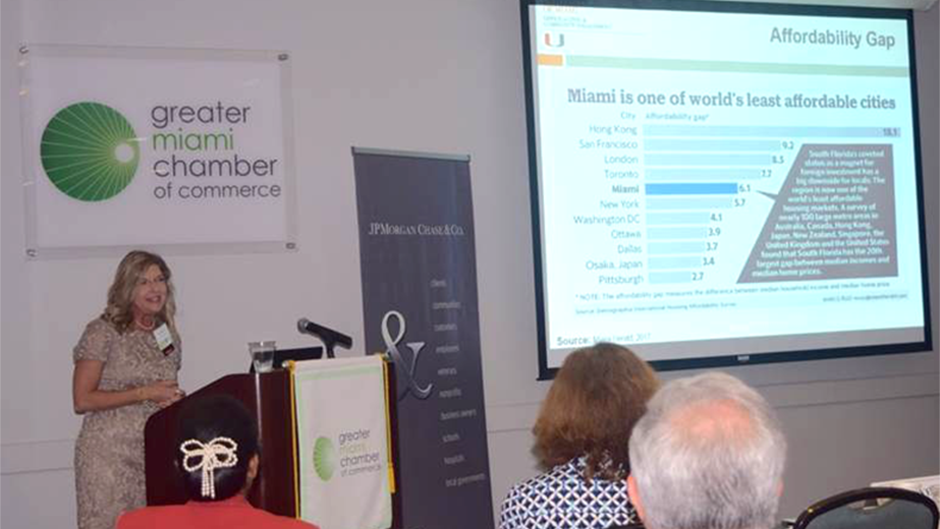A minimum-wage worker would have to hold three full-time jobs to afford an average market-rate apartment in Miami, a city with the nation’s highest share of severely cost-burdened renters—individuals and families who spend at least 50 percent of their income on housing.
With Miami remaining one of the least affordable cities in the world, the UM Office of Civic and Community Engagement (CCE) unveiled its new Miami Housing Solutions Lab to help address Miami’s affordable housing shortage.
Sponsored by two generous grants from JPMorgan Chase & Co.—along with funding from the Health Foundation of South Florida and the Jessie Ball duPont Fund—the online resource offers valuable tools on affordable housing and community development in South Florida.
“Addressing affordable housing in South Florida requires a culture of collaboration and an ethic of reciprocity,” said Robin Bachin, UM’s assistant provost for civic and community engagement and the Charlton W. Tebeau Associate Professor of History, who leads CCE’s groundbreaking work on affordable housing. “We have worked to create tools and solutions to help stakeholders develop best policies and strategies given our local infrastructure.”
A key feature of the Housing Solutions Lab is the expansion of the Miami Affordability Project (MAP), a free, interactive online map containing information on housing, demographics, and property data that facilitates neighborhood-level analysis across Miami and beyond. Since its 2015 launch, MAP has become the preeminent resource for planners, affordable housing developers, community groups, government agencies, and other leaders looking to preserve and develop affordable housing in Miami.
The expanded “MAP 2.0” builds upon MAP’s four datasets— Developments, Neighborhoods, Parcels, and Historic—to add geocoded housing and census data for Broward and Palm Beach counties. In Miami-Dade, MAP now includes parcel-level data on several Miami-Dade communities, including Overtown, Liberty City, Little Havana, Little Haiti, South Dade, and the city of Miami Gardens. Additional features include historic preservation information, as well as overlays for commission districts and Community Redevelopment Areas.
Guillermo Castillo, managing director and region manager for South Florida of JPMorgan Chase, said he is proud to have funded this important project. “The lowest rate of affordable housing does not work in a place called paradise,” he said, noting that a rising number of families with children, veterans, and people with disabilities are negatively impacted by the lack of affordable housing.
Other resources available through the Housing Solutions Lab are:
- A Housing Policy Timeline, which highlights major policy milestones in housing policy and finance, and their impacts on Miami’s neighborhoods.
- The Housing Policy Toolkit, which outlines innovative policies that promote affordable housing nationwide and examines how these strategies can be adapted to the Miami market and targeted to specific neighborhoods.
The tool now also links housing with health care data in a new platform called the Community Health Project (http://healthtool.ccs.miami.edu/HealthFoundation/map). Funded by the Health Foundation of South Florida, the Community Health Project visualizes neighborhood-level health data to promote more data-driven community development and health solutions for Miami Gardens and the Little Havana neighborhood. The platform enables community groups, service providers, and planners to map and sort through community-level social determinants of health, including housing conditions, access to hospitals, and land-use data.
The Community Health Project contains six layers—Primary Healthcare, Physical Activity, Healthy Eating/Nutrition Measures, Housing Conditions/Affordability, Historic Preservation, and Public Safety and Planning—along with over 20 data filters containing the latest information from the American Community Survey, the U.S. Health Resources and Services Administration, and the Miami-Dade County Property Appraiser.
At the lab’s official launch, which took place at the Greater Miami Chamber of Commerce on Wednesday, October 18, UM Senior Vice Provost and Dean of Undergraduate Education William Scott Green thanked JPMorgan Chase and the Health Foundation for their “visionary support of a uniquely human enterprise.” He noted that, while birds know innately how to nest and beavers are born with an inclination to build dams, “we humans appear not to have a housing instinct.”
“Map2.0 will provide the data for what we might think of as a virtual housing instinct,” Green said. “It will enable us to make informed and reliable decisions about how to create appropriate housing for all the members of our community.”

